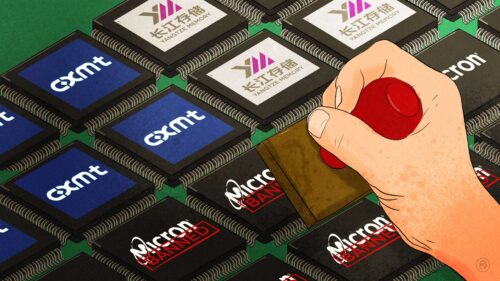Top 10 Chinese autonomous driving companies to watch
A hefty Nasdaq listing for a Chinese company in the autonomous vehicle ecosystem signals growth for the sector at large. Here’s a list of the leading Chinese companies.

On February 9, little-known company Hesai debuted on Nasdaq in the biggest IPO by a Chinese firm since ride-hailing company Didi Chuxing listed in 2021. Raising $190 million, the listing was generally seen as a positive development for the investment environment between the U.S. and China, even as balloons and other UFOs roiled the political relationship.
The listing portends another key trend however: growth in China’s burgeoning autonomous vehicle (AV) sector. Self-driving cars, AI-assisted driving and related technologies are already of enormous interest to investors and trend forecasters; the industry is forecast to grow by over $100 billion from 2023 to 2027.
Hesai produces light detection and ranging (LiDAR) cameras for self-driving vehicles — devices that allow cars and trucks to “see” their surroundings and operate autonomously. Hesai is a supplier for several Chinese AV firms, including AutoX, Baidu’s Apollo, and WeRide.
Hesai’s cameras are just one part of an ecosystem of hardware and software products that the industry relies on to make autonomous vehicles possible; AVs require operating systems, LiDAR and RADAR devices, cameras, mapping computers, and semiconductors. The company’s listing signals a broader trend of a growing sector and demand for the building blocks of autonomous vehicles.
China news, weekly.
Sign up for The China Project’s weekly newsletter, our free roundup of the most important China stories.
China wants to be in the driving seat
Proponents of autonomous driving technology point out its potential to reduce traffic accidents and congestion, and to increase productivity and efficiency. Among those proponents is China’s government, which has made it clear it wants China to be a global leader in emerging technologies, and has explicitly included autonomous driving in its tech push.
Dozens of cities have been granted licenses for pilot zones for some forms of autonomous vehicle (autonomous vehicles are ranked on a range from L0, which involves no autonomy, to L5, full autonomy. So far, only Shenzhen has rolled out comprehensive regulations to govern the use of L5 vehicles).
The central government highlighted autonomous vehicles in its 14th Five-Year Plan, and continues to roll out relevant regulations, such as recently published guidelines on autonomous shipping. Lower levels of automation are becoming quite common; a report from the International Data Corporation showed that L2 autonomous vehicles had reached a penetration rate of 26.2% in China by the second quarter of 2022 (with L2 autonomy the vehicle can perform tasks like steering and acceleration).
With official support and a growing ecosystem of companies to support it, China’s AV sector is poised to make a play for global dominance. Below are ten of the must-watch companies in China’s AV sector, including firms that make LiDAR and other sensing devices for vehicles, chipmakers specializing in AVs, and companies developing the advanced driver-assistance systems (ADAS) required to operate driverless vehicles.
Baidu Apollo
Baidu’s in-house AV unit, Apollo, launched in 2017, is at the leading edge of self-driving and driver-assistance systems in China. Apollo’s products include its Duer operating system for cars, its autonomous ride-hailing fleet, and self-driving electric vehicles (EVs).
Apollo benefits from access to Baidu’s vast stores of search queries, images, video, and positioning data, which provide crucial training for its AI to confront myriad situations on the road. Baidu also produces various hardware parts for its AVs, including devices to collect and process data crucial to autonomous driving. In March of 2022, Apollo announced it had hit 25 million kilometers (15.5 million miles) of test driving, and it blew the competition out of the water in rankings for most test driving done in Beijing from 2018 to 2020.
Apollo has partnered with auto manufacturers including Ford, Toyota, and Chinese firms SAIC, GAC, Great Wall, Weltmeister (also backed by Baidu), and Geely, with which Baidu partnered to begin a new electric AV brand, Jidu. Apollo Go, the platform on which users can order self-driving taxis, began offering ride-hailing services in Beijing in November 2021, according to its 2022 annual SEC filing, and hit 1 million rides across the country in August 2022. Also in August, the company became the first to receive a license for fully autonomous robotaxis from China’s government. The company has said it aims to have 100,000 robotaxis on roads in China in 2023.
WeRide 文远知行
Established in 2017, Guangzhou-based WeRide offers services including an L4 robotaxi fleet made up of Nissan and GAC vehicles, which users can call through the WeRide app. The company has also developed a small driverless passenger bus (Mini Robobus), driverless delivery vans (Robovan), and an autonomous urban cleaning vehicle (Robo Street Sweeper).
WeRide has operations in over 25 cities, its vehicles have traversed more than 13 million kilometers (8 million miles), and has been valued at more than $4 billion, according to its website.
WeRide is forging ahead on several fronts, and in January 2023 became the first company to be granted a license to test its driverless buses on Beijing’s roads. It has also recently announced partnerships with German auto parts manufacturer Bosch and Chinese robotics company Horizon to coordinate manufacturing and improvements to the systems operating its L4 AVs.
AutoX 安途智行科技
Founded in 2016, AutoX has grown to operate what it claims is the largest fleet of fully driverless robotaxis in Asia, surpassing 1,000 vehicles in February 2022, available to users in Shenzhen, Guangzhou, Beijing and Shanghai.
With only $160 million in private funding so far, AutoX has not raised as much money as competitors like Pony.ai and WeRide, but has been able to keep up with the competition on certain metrics. During its more than 50,000 miles of test drives in California in 2022, the company only reported one instance in which the safety employee had to disengage the automated driver, according to California’s DMV report on AV test drives in 2022 (WeRide reported three disengagements in nearly 65,000 miles of testing, and Pony.ai 20 in over 280,000 miles).
Founded and majority-owned by former Princeton professor and founder of that university’s Computer Vision and Robotics Labs, Xiāo Jiànxióng 肖健雄 (who likes to go by the moniker “Professor X”), the company has received funding from Chinese automaker Dongfeng, as well as Alibaba and Softbank’s Vision Fund. In addition to working with Dongfeng, AutoX has partnered with Ford, Chrysler, SAIC, BYD, and Chery.
AutoX’s fleet includes both conventional and EVs, but is moving toward fully deploying EVs. Jewel Li (李卓 Lǐ Zhuō), COO of the company, told Forbes that EVs are better suited to the company’s autonomous driving hardware and software systems.
Hirain Technologies 经纬海润
Founded in Beijing in 2003, Hirain Tech is a major supplier of front-facing cameras for cars, and has forged its way into the AV industry. Hirain sells directly to automakers like FAW, SAIC and BAIC, who then go on to partner with firms such as AutoX and WeRide, which provide the operating systems necessary for the AVs to operate.
Hirain has provided products and services for the operation of an autonomous fleet of trucks in China’s Rizhao port. In a 2022 list of top suppliers of front-facing cameras in China’s auto market, Hirain was the only Chinese firm listed. In 2021, the firm completed a new research and development center in Tianjin, where it says it will work on intelligent network technology and high-level intelligent driving systems.
Haomo.ai 毫末智行科技
Founded in 2019 and controlled by the chairman of Great Wall Motor, Wèi Jiànjūn 魏建军, Haomo.ai came onto China’s AV scene a bit more recently than other firms on this list, but has wasted no time in catching up.
With funding from Qualcomm and Chinese food delivery giant Meituan, Haomo.ai has partnered with Great Wall to deploy its Navigation on HPilot (NOH) driver-assistance system in its WEY Mocca, WEY Latte, WEY Macchiato, and Tank 500 passenger vehicles, along with low-speed unmanned logistics vehicles.
At a conference in 2022, the company’s CEO claimed that Haomo.ai’s systems had helped drivers trek over 15 million kilometers (9.3 million miles) throughout China. Haomo.ai also recently announced that its NOH driver-assistance system would by 2024 be usable in 100 cities across China.
Haomo.ai made waves last month after it announced it would partner with ByteDance-owned cloud service provider Volcano Engine on Mana Oasis, a computing center with more processing power than any other center of its kind in China. The higher computing power enables vehicles connected to the center to more accurately map out and navigate their respective environments.
Inceptio 嬴彻科技
Founded in 2018 with research and development centers in both Shanghai and Fremont, California, Inceptio Technology focuses on developing autonomous driving technologies for trucks with the goal of creating a nationwide autonomous logistics network.
The company’s trucks hit 10 million kilometers (6.2 million miles) of commercial driving on Inceptio’s L3 Xuanyuan system, with the firm touting on its website a 100% success rate in punctual delivery with zero accidents and more than 90% of drives conducted autonomously.
Meituan and NIO Capital have invested in Inceptio, which has partnered with truck-makers Dongfeng and Sinotruk 中国重型汽车 to deploy its driver-assistance systems in commercial vehicles. With operations in California, the company also holds a permit from the state’s DMV allowing it to conduct test drives.
Pony.ai 小马智行
Founded in 2016, Pony.ai claims to be the first company to deploy a fleet of self-driving cars in China, launching its vehicles onto public roads in February 2017.
Partnering with Chinese automaker GAC and Toyota, Pony.ai launched PonyPilot in 2017, its robotaxi ride-hailing app, later teaming up with travel agency Cáocāo 曹操出行 in a new iteration of the app. In 2018, the firm revealed plans for self-driving freight trucks and in late 2019 it became the first company in China to be granted a permit to operate these trucks, in Guangzhou.
Pony.ai plans to mass produce these trucks in partnership with construction equipment manufacturer Sany Heavy Industry. In 2022 Pony.ai held the record for the most test miles driven in California by any Chinese company (despite having its permit revoked in May after multiple safety violations), clocking over 280,000 test miles. It also has a permit to test drive in Arizona.
Robosense 速腾聚创科技
Like Hesai, Robosense specializes in the production of LiDAR devices used in several contexts, including AVs.
Founded in 2014, the Shenzhen-based company’s products have been used by firms like WeRide and Baidu Apollo in autonomous driving passenger cars and robotaxis, commercial vehicles, automated logistics vehicles, self-driving buses and trucks, as well as in new smart transportation infrastructure.
Robosense has taken investment from Chinese auto manufacturer BYD, and this month announced a new partnership with Toyota to provide the Japanese powerhouse with LiDAR systems for its intelligent models.
Horizon Robotics 地平线
Founded in 2015, Horizon Robotics markets several hardware and software products, but is perhaps best known for developing computing chips like its latest Journey 5 automotive inference processor.
Competing with the likes of Israel’s Mobileye and Nvidia to provide high quality chips for AVs, Horizon has partnered with a host of Chinese automakers like Li Auto, BYD, SAIC and others. Horizon has received funding from the likes of Intel, German software company Cariad, and Chinese automakers like Chery and FAW Group, raising a total of over $3 billion.
Recent reports claim the firm could be looking to list soon in Hong Kong in an IPO that could raise up to $200 million. Given chip restrictions imposed by the U.S. government on Chinese firms, Chinese companies like those mentioned above may in the future have to rely on domestic firms like Horizon.
Black Sesame Technologies 黑芝麻智能科技
Like Horizon Robotics, Black Sesame, founded in 2016, is at the crux of AVs and computing chips, claiming on its website that it “knows chips better than the automotive industry, and knows cars better than the chip industry.”
Backed by Chinese mobile phone company Xiaomi, Black Sesame became the first Chinese firm to mass produce AI chips for driverless cars in April 2022. The company was recently featured on a Forbes list of new Chinese unicorns, having reached a $1 billion valuation in December. As with Horizon Robotics, recent reports have claimed Black Sesame is preparing for a $200 million Hong Kong IPO.
Road hazard ahead for self-driving tech
Chinese engineers and companies are going full speed on autonomous driving technology, but geopolitical tensions between the U.S. and China could slow them down dramatically.
Nvidia, an American firm that produces some of the most advanced computer chips for self-driving vehicles, has seen its ability to export to China severely restricted by recent U.S. regulations. So far, these regulations haven’t prevented the export of Nvidia’s Drive Orin chip, used in many Chinese AVs. But if current trends continue, inability to access U.S.-made chips could affect China’s AV firms.
A look at Apollo’s page listing the hardware used in its vehicles encapsulates the global supply chains of the AV industry in a nutshell. Apollo buys LiDAR devices from U.S.-based Velodyne and Innovusion, as well as from China-based Hesai and Robosense, processors from Taiwan’s Neousys Tech, and navigation systems from Canadian firm NovAtel (not to mention a host of other vendors).
American lawmakers have already identified risks that come with Chinese-made products in AVs operating in the U.S. Representative August Pfluger (R-TX) wrote a letter to the U.S. National Highway Traffic Safety Administration inquiring as to whether it had considered the national security implications of Chinese AVs driving around sensitive sites in the U.S. (Chinese firms Deeproute.ai, AutoX, NIO, WeRide, and others have permits to test drive their vehicles in California). Federal investigators also recently began a probe into U.S. autonomous trucking firm TuSimple for allegedly transferring technology to Chinese firm Hydron, and by doing so defrauding American investors.
Accidents made by AVs could also slow the industry’s development. An unsettling viral video showed a Tesla that sped through a Chinese town in November 2022 and left two people dead. As of September 2022, Beijing had recorded 18 accidents in its AV pilot zone.
Finally, Chinese AV firms have to reckon with stiff American competition. Google, Amazon, Apple, Tesla, and other American firms are hard at work in their attempts to dominate the AV industry.






